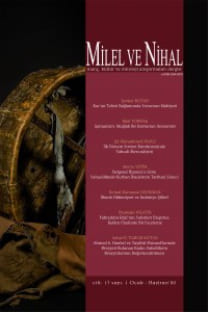Gerçek ile Kurgu Arasında “Öteki”
Milel ve Nihal geleneğinde öteki ile yüzleşmenin anlamı nedir? Soruyu daha köklü biçimde sorarsak, İslam düşüncesinde gerçek anlamıyla “öteki” kavramı veya bilinci söz konusu mudur? Kuşkusuz bu sorunun anlamını belirleme çabasının ilk (ve belki de son) uğrak yeri İslam’ın tevhid anlayışı karşısında beşeri düşüncenin nerede ve nasıl konumlandırılacağı sorusudur. Bu makalenin temel iddiası şudur: İslam’ın dışındaki diğer inançlara bağlı insanlar İslam dini ve Müslümanlar için bir “öteki” değildir. Yalnızca onların tek Tanrı karşısında “bir ‘öteki’ oluşturma çabaları” İslam’ın ve Müslümanların reddettiği bir husustur. Daha açık deyişle, tevhid inancının mantıksal bir uzantısı olan İslam’ın evrenselliği anlayışı, bu evrensellik (dolayısıyla tevhid) anlayışını sınırlayacak bir “öteki”ne ya da ötekini gerçek biçimde konumlandıracak harici bir mekan anlayışına izin vermemiştir.
“Other” in between Reality and Fiction
What is the meaning of “confrontation with the other” in the tradition of Milal and Nihal? To ask the question more basically, is there a full concept and consciousness of “Other” in Islamic thought? Any attempt for exploring the meaning of these questions has to take into consideration first (and maybe last) the question where and how human thought can be situated with reference to Islamic notion of tawhid. The basic claim of this paper is as follows: the men of other belief systems are not real “other” for Islam and Muslims. Islam and Muslims refute basically their attempt to speculate (or culturally construct) an “other” over against unique God of Islam. Said more openly, Islam’s claim to universality (which is logical extension of its notion of tawhid) cannot allow a space for speculation or cultural construction of other as a restriction of its claim to universality.
